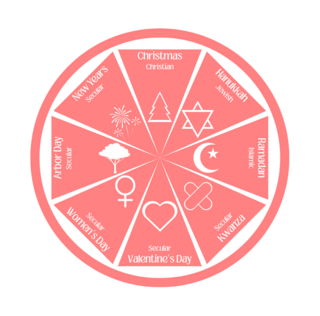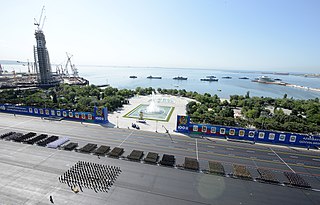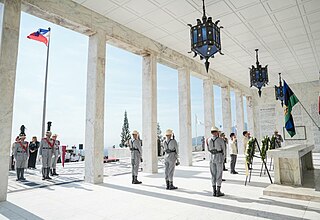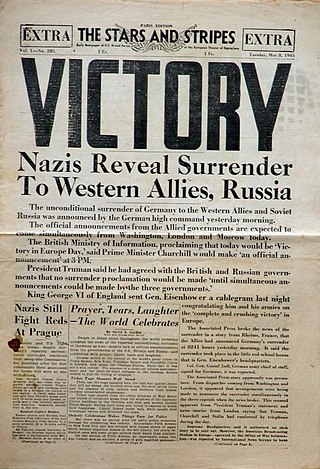
A holiday is a day or other period of time set aside for festivals or recreation. Public holidays are set by public authorities and vary by state or region. Religious holidays are set by religious organisations for their members and are often also observed as public holidays in religious majority countries. Some religious holidays, such as Christmas, have become secularised by part or all of those who observe them. In addition to secularisation, many holidays have become commercialised due to the growth of industry.

May is the fifth month of the year in the Julian and Gregorian calendars. Its length is 31 days.

Columbus Day is a national holiday in many countries of the Americas and elsewhere, and a federal holiday in the United States, which officially celebrates the anniversary of Christopher Columbus's arrival in the Americas. Columbus went ashore at Guanahaní, an island in the Bahamas, on October 12, 1492. On his return in 1493, Columbus moved his coastal base of operations 70 miles east to the island of Hispaniola, what is now the Dominican Republic and established the settlement of La Isabela, the first permanent Spanish settlement in the Americas.

Veterans Day is a federal holiday in the United States observed annually on November 11, for honoring military veterans of the United States Armed Forces. It began, and now coincides with other holidays, including Armistice Day and Remembrance Day, which are commemorated in other countries, marking the anniversary of the end of World War I. Major hostilities of World War I were formally ended at the 11th hour of the 11th day of the 11th month of 1918 when the Armistice with Germany went into effect. At the urging of major U.S. veteran organizations, Armistice Day was renamed Veterans Day in 1954.

Victory in Europe Day is the day celebrating the formal acceptance by the Allies of World War II of Germany's unconditional surrender of its armed forces on Tuesday, 8 May 1945; it marked the official end of World War II in Europe in the Eastern Front, with the last known shots fired on 11 May. Russia and some former Soviet countries celebrate on 9 May, as Germany's unconditional surrender entered into force at 23:01 on 8 May Central European Summer Time; this corresponded with 00:01 on 9 May in Moscow Time.

Victory Day is a holiday that commemorates the Soviet victory over Nazi Germany in 1945. It was first inaugurated in the 15 republics of the Soviet Union following the signing of the German Instrument of Surrender late in the evening on 8 May 1945. The Soviet government announced the victory early on 9 May after the signing ceremony in Berlin. Although the official inauguration occurred in 1945, the holiday became a non-labor day only in 1965, and only in certain Soviet republics.

Victory over Japan Day is the day on which Imperial Japan surrendered in World War II, in effect bringing the war to an end. The term has been applied to both of the days on which the initial announcement of Japan's surrender was made – 15 August 1945, in Japan, and because of time zone differences, 14 August 1945 – as well as to 2 September 1945, when the surrender document was signed, officially ending World War II.

In the United States, public holidays are set by federal, state, and local governments and are often observed by closing government offices or giving government employees paid time off. The federal government does not require any private business to close or offer paid time off, as is the case for most state local governments, so employers determine which holidays to observe.

A military parade is a formation of soldiers whose movement is restricted by close-order manoeuvering known as drilling or marching. Large military parades are today held on major holidays and military events around the world. Massed parades may also hold a role for propaganda purposes, being used to exhibit the apparent military strength of a country.

Several nations observe or have observed a Navy Day to recognize their navy.

An Armed Forces Day, alongside its branch-specific variants often referred to as Army or Soldier's Day, Navy or Sailor's Day, and Air Force or Aviator's Day, is a holiday dedicated to honoring the armed forces, or one of their branches, of a sovereign state, including their personnel, history, achievements, and perceived sacrifices. It's often patriotic or nationalistic in nature, carrying propaganda value outside of the conventional boundaries of a military's subculture and into the wider civilian society. Many nations around the world observe this day. It is usually distinct from a Veterans or Memorial Day.

Independence Day, known colloquially as the Fourth of July, is a federal holiday in the United States commemorating the Declaration of Independence, which was ratified by the Second Continental Congress on July 4, 1776, establishing the United States of America.

The following is the list of official public holidays recognized by the Government of Russia. On these days, government offices, embassies and some shops, are closed. If the date of observance falls on a weekend, the following Monday will be a day off in lieu of the holiday.

Lincoln's Birthday is a legal, public holiday in some U.S. states, observed on the anniversary of Abraham Lincoln's birth on February 12, 1809, in Hodgenville, Kentucky. Connecticut, Illinois, Indiana, Michigan, Ohio, California, Missouri, and New York observe the holiday.

Victory Day is a commonly used name for public holidays in various countries, where it commemorates a nation's triumph over a hostile force in a war or the liberation of a country from hostile occupation. In many cases, multiple countries may observe the same holiday, with the most prominent united celebrations occurring in states that comprised the Allies of World War II, celebrating the defeat of Nazi Germany.

Thanksgiving is a national holiday celebrated on various dates in October and November in the United States, Canada, Saint Lucia, Liberia, and unofficially in countries like Brazil, Germany and the Philippines. It is also observed in the Dutch town of Leiden and the Australian territory of Norfolk Island. It began as a day of giving thanks for the blessings of the harvest and of the preceding year. Various similarly named harvest festival holidays occur throughout the world during autumn. Although Thanksgiving has historical roots in religious and cultural traditions, it has long been celebrated as a secular holiday as well.

The Day of Valor, officially known as Araw ng Kagitingan, is a national observance in the Philippines which commemorates the fall of Bataan to Japanese troops during World War II. The day is officially celebrated every April 9, the start of the Bataan Death March, although the date was moved on several occasions to avoid it from coinciding with the observance of the Holy Week in the country, especially the Easter Triduum and Easter Sunday, such as in 2009 and 2023.

The Time of Remembrance and Reconciliation for Those Who Lost Their Lives during the Second World War is an annual international day of remembrance designated by Resolution 59/26 of the United Nations General Assembly on November 22, 2004. The resolution urges 'Member States, organizations of the United Nations system, non-governmental organizations and individuals' to pay tribute to the victims of World War II.

Liberation Day is the national day of both Guernsey and Jersey, the two largest of the Channel Islands, which takes place on 9 May each year. It commemorates the liberation of the Channel Islands on 9 May 1945, which marked the end of the islands' occupation by Nazi Germany during World War II. It falls on the same day as the European Union's Europe Day, which celebrates post-World War II peace and European unity. 9 May is a public holiday in both islands and each has different celebrations and commemorative events; the centrepiece of Jersey's is the Liberation Day re-enactment in the Liberation Square, while Guernsey's is an islandwide cavalcade of classic vehicles.

Victory Day over Nazism in World War II was a national holiday and a non-working day in Ukraine from 2015 to 2023.





















